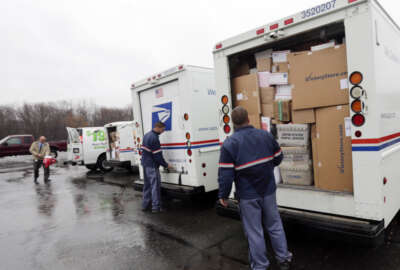Don’t look for Postal Service letter carriers out on the campaign trail in 2018.
The Postal Service will no longer permit leave without pay for union political activities, after it recommended a “hands off” approach to the service’s union political activities.
Testifying during a July 19 Senate Homeland Security and Governmental Affairs Committee hearing, Postmaster General Megan Brennan said the case was one of “first impression” for the Office of Special Counsel, and the Postal Service “fully [accepts] and will fully implement their recommendations and directions and we will no longer permit leave without pay for union political activities.”
“It’s in our interest to maintain and foster good working relationships with the union,” Brennan said. “What transpired here was a long-standing practice that was accepted, that expanded the definition of union leave, to union leave for for political activity.”
The Hatch Act applies to all executive branch employees, except the president and vice president. It generally prohibits federal employees from engaging in political activity on-duty or in the workplace, while wearing an official uniform, insignia, or using a government vehicle.
At issue is a complaint from Timm Kopp, a letter carrier based in Marshfield, Wisconsin. According to written and spoken testimony from Kopp — who testified during the hearing — during fall 2016, State National Association of Letter Carriers President Scott Van-Derven attended a local union meeting, and spoke about congressional bills the union was supporting and also mentioned a need for campaign volunteers for the upcoming election.
Several weeks later, a letter carrier informed Kopp that he was going to volunteer, and would be gone for five weeks — starting in just two days. At least one other nearby post office found itself in the same position, Kopp said, and for those weeks the employees were gone, supervisors scrambled to fill shifts through overtime and loaning out personnel.
Calls to the union at all levels left Kopp with the same answer, he said, which was “basically this is how it’s been done for years, you don’t need to question this, we’re just trying to help preserve your job.”
“I want the [Postal Service] to succeed in the long term, not just look to this election or a year down the road,” Kopp said. “I want it to be sustainable. There are a lot of employees that work there and a lot of good employees there. The way that this was done, and from reading the other reports, it was just a nightmare.”
According to a report from the Postal Service’s inspector general, between September and November 2016, 97 letter carriers took leave without pay to participate in campaigns ranging anywhere from four to 50 days, for a total of more than 2,700 days off. An audit of 22 of the 97 absences found that use of leave without pay resulted in net overtime costs of more than $90,000.
Eighty-two percent of the time was taken from carriers in Florida, Nevada, North Carolina, Ohio, Pennsylvania, and Wisconsin. They were all associated with the National Association of Letter Carriers.
Acting Deputy Inspector General for the Postal Service William Siemer said during the investigation, it seemed as though taking leave without pay for political campaigning “was adopted just as a practice, where nobody was really looking at it through the lens of ‘is this appropriate or not.'”
“I don’t believe anybody questioned it in the labor relations headquarters office, whether or not what they were doing was wrong,” Siemer said. “I’m not sure there was any analysis given to whether or not what they were doing should be done.”
OSC’s report highlighted that not only are postal unions and employees allowed to maintain political action committees and endorse candidates, “the law, in fact, encourages them,” along with enlisting union members to help support campaign agenda on their own time.
What OSC found, however, was that despite concerns from local supervisors that the carriers on union official leave without pay would have an impact on operations, and objections to the some carriers’ release, “USPS managers instructed the local supervisors to release all listed carriers so they could participate in NALC’s political activity.”
“We concluded that the USPS practice of facilitating and directing carrier releases for the union’s political activity resulted in an institutional bias in favor of NALC’s endorsed political candidates, which the Hatch Act prohibits,” OSC’s Acting Special Counsel Adam Miles said in his testimony.
In a statement, Fredric Rolando, president of NACL, which represents more than 213,000 postal employees, said while NALC agreed with OSC’s statement on Postal Service employees being encouraged to participate in campaigns, “we reject the OSC’s conclusions that the granting of LWOP represents either a ‘systematic violation of the Hatch Act’ or an ‘institutional bias in favor of NALC’s endorsed political candidates.'”
An NALC representative was not included on the witness list for the hearing.
Brennan said the label of “institutional bias and a systemic violation” were “pretty damning,” and she would be communicating plans to meet OSC’s recommendations back to the organization, to ensure there are no future Hatch Act violations.
Sen. Claire McCaskill (D-Mo.) said the incident only served to highlight the need for postal reform.
“We need to get postal reform done,” McCaskill said. “These things, they all land in your lap and you’re there alone. And this needs be fixed and we need to have better opportunities for oversight and accountability on service standards, on a whole host of issues.”
Sen. Ron Johnson (R-Wis.), whose office received one of Kopp’s phone calls, said while the case highlights a problem, “in many respects [it’s] a real good news story.”
“No retaliation, total cooperation between the Postal Service and the inspector general and the Office of Special Counsel,” Johnson said. “This is the way the process should work.”
Copyright
© 2024 Federal News Network. All rights reserved. This website is not intended for users located within the European Economic Area.
